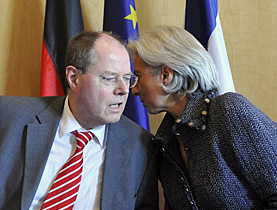Swiss ready to talk taxes amid war of words

Swiss President Hans-Rudolf Merz says the government is ready to renegotiate tax agreements with other countries despite a war of words with the Germans.
The cabinet met on Thursday to discuss reaction to the country’s decision to soften sections of banking secrecy laws to avoid being blacklisted as an uncooperative tax haven.
So far the United States, France and Japan have reacted warmly to promises to add some transparency to Swiss banking. Those countries have already asked to sit down with the Swiss to go over accords regulating double taxation and ways to bring them in line with international standards.
“The government will continue its efforts to prevent a blacklisting of Switzerland by the Group of 20,” Merz said at a news conference in Bern. “Once we agree on the general conditions, negotiations (on double taxation) will begin quickly, certainly not a matter of months.”
The statement could serve to counter doubts raised by German Finance Minister Peer Steinbrück in recent weeks about whether the Swiss will follow through on promises to facilitate the exchange of banking information.
Merz insisted on Thursday that banking secrecy would remain intact for Swiss nationals.
But he tried to strike a more conciliatory tone after Swiss parliamentarians on Wednesday lashed Steinbrück for likening Switzerland to scared Native Americans living under the threat of a powerful cavalry attack. One Swiss politician hinted that the German minister reminded him of Nazis.
“Problems can’t be solved with verbal attacks and insults,” Merz said. “For my part I never have and never will insult anybody. It is not my style.”
Strategy
As for what happens next, Merz said the finance ministry, which he also heads, would prepare a strategy on behalf of the cabinet to set general conditions on when Swiss authorities could provide other countries with bank-client data.
Merz could not offer details on Thursday but said the ministry should know more in about a week. Meanwhile, the foreign and economic ministries would work with Merz and the finance ministry on proposals for how to handle negotiations on tax agreements with the European Union.
Issues with Washington would also take centre stage, he said.
“It is reasonable to assume that negotiations with the United States are a certain priority,” Merz added. “But we can only say for sure next week.”
In the interim, international pressure is likely to build. Finance ministers from around the world are meeting in Britain this weekend to prepare for a meeting of G20 nations on April 2.
The Germans have spearheaded a push on behalf of the group to force countries into cooperating with each other with investigations into tax evasion, which is not a crime in Switzerland.
War of words
Merz worked to add some perspective to a debate that turned icy this week between the German finance minister and Swiss politicians.
Steinbrück’s cavalry comment isn’t the first time he has irritated his southern neighbour. Last autumn he made a suggestion that someone needed to “take a whip” to the Swiss to get them to come into line with banking secrecy.
Foreign Minister Micheline Calmy-Rey strongly objected to his tone at the time and since then has had to summon the German ambassador to Bern twice within weeks to lodge complaints.
“One day we will have to sit together again in the interest of the country,” Merz said about his German counterpart.
“Let’s not forget that Germany is one of the main markets for our key export sector. There are also many leading German politicians who are favourable towards Switzerland. I will travel to Berlin to solve problems, not give lessons.”
No such trip is currently planned.
Other members of parliament have also tried to reach north to Berlin to get Steinbrück to soften his rhetoric. The Social Democrats in Switzerland reportedly wrote to their party members in Germany, as Steinbrück is also a Social Democrat.
“Such pronouncements are counterproductive and could slow down the current development,” the Swiss wrote in a letter quoted by Der Spiegel news magazine. “We ask that you and Peer refrain from making such statements in the future.”
swissinfo with agencies
About 233,000 Germans live in Switzerland.
Sixteen per cent more Germans moved to Switzerland in 2008 than in 2007.
They are the fastest-growing major-minority in the country.
Germany is Switzerland’s largest trading partner with a volume of annual goods worth at least SFr80 billion trading hands.
Feb. 14, 2008 German police raid the home of Klaus Zumwinkel, then chief executive of Deutsche Post, as part of a nationwide investigation on tax havens.
Oct. 21, 2008 German Finance Minister Peer Steinbrück calls for Switzerland to be placed on a blacklist of uncooperative tax havens since it “offers conditions that invite the German taxpayer to evade taxes.”
March 12, 2009 Blacklisted Liechtenstein relaxes bank-secrecy code, a decision that puts pressure on neighbouring Switzerland to follow suit.
March 16, 2009 Switzerland signals a readiness to become more transparent, but Steinbrück questions whether Switzerland will follow through.
March 17, 2009 Steinbrueck compares tax havens to “Indians” running scared from the cavalry, causing outrage in Switzerland. Days later, the Swiss government summons the German ambassador to complain. Swiss Foreign Minister Micheline Calmy-Rey calls the
comments “totally unacceptable”.

In compliance with the JTI standards
More: SWI swissinfo.ch certified by the Journalism Trust Initiative





You can find an overview of ongoing debates with our journalists here. Please join us!
If you want to start a conversation about a topic raised in this article or want to report factual errors, email us at english@swissinfo.ch.